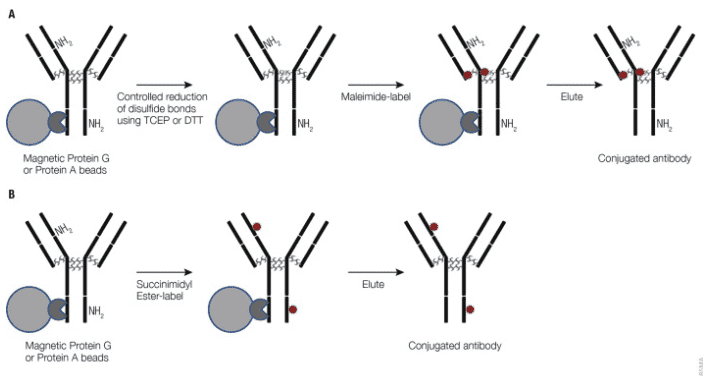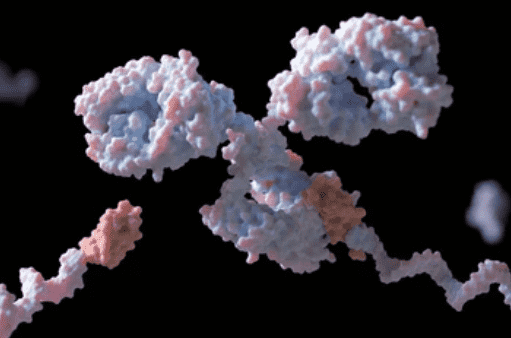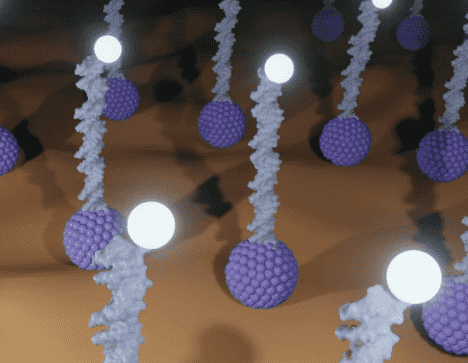- Home
-
Products
- Magnetic Ionic Liquid
-
Magnetic Beads
- Streptavidin Magnetic Beads
- Aldehyde Magnetic Beads
- Alkynyl Magnetic Beads
- Amino Magnetic Beads
- Avidin Magnetic Bead
- Azide Magnetic Beads
- Carboxyl Magnetic Beads
- DEAE Magnetic Beads
- Epoxy Magnetic Beads
- Heparin Magnetic Beads
- Hydroxyl Magnetic Beads
- NHS Magnetic Beads
- Phenyl Magnetic Beads
- Protein Magnetic Beads
- Silica Magnetic Beads
- Silicon Magnetic Beads
- Thiol Magnetic Beads
- Tosyl Magnetic Beads
- Magnetic Nanodispersion
- Ferrite Magnetic Nanopowder
- High-Purity Magnetic Nanomaterials
- Magnetic Polystyrene Microspheres
- Magnetic Bead Kit
- Magnetic Iron Oxide Nanocrystals
-
Magnetic Nanoparticles
- Amino-Functionalized Magnetic Nanoparticles
- Carboxyl-Functionalized Magnetic Nanoparticles
- Epoxy-Functionalized Magnetic Nanoparticles
- Hydrophobic Magnetic Nanoparticles
- IDA-Functionalized Magnetic Nanoparticles
- Magnetic Fe2O3 Nanoparticles
- Magnetic Fe3O4 Nanoparticles
- PEI Magnetic Nanoparticles
- PVA Magnetic Nanoparticles
- Silanol-Functionalized Magnetic Nanoparticles
- Urea Formaldehyde Magnetic Nanoparticles
- PAMAM Magnetic Nanoparticles
- Protein A Magnetic Nanoparticles
- Protein G Magnetic Nanoparticles
- Streptavidin Magnetic Nanoparticles
- Magnetic Silica Microspheres
-
Services
- Biomagnetic Material
- Magnetic Hydrogel Services
- Rare Earth Magnetic Materials Services
- Magnetic Ionic Liquid Services
- Magnetic Nanomaterials Services
- Magnetic Activated Carbon Service
- Molecular Magnetic Materials Services
- Magnetic Compounds Services
-
Custom Magnetic Beads Services
-
Biofunctionalized Magnetic Bead Services
- Magnetic Bead Protein Conjugation Services
- Magnetic Bead Antibody Conjugation Services
- Magnetic Bead Aptamer Conjugation Services
- Magnetic Bead Carbohydrate Conjugation Services
- Magnetic Bead Nucleic Acid Conjugation Services
- Magnetic Bead Drug Conjugation Services
- Magnetic Bead Enzyme Conjugation Services
- Magnetic Bead Metal Conjugation Services
- Magnetic Bead Multifunctional Composite Conjugation Services
- Magnetic Bean Affinity Tag Conjugation Services
- Magnetic Bead Affinity Ligand Conjugation Services
- Magnetic Bead Antigen Conjugation Services
- Magnetic Bead Fluorescent Material Conjugation Services
- Magnetic Bead Multiplex Conjugation Services
- Magnetic Bead Stimulus-Responsive Modification Services
- Magnetic Bead Enzyme-Responsive Modification Services
- Magnetic Bead Peptide Conjugation Services
- Magnetic Beads Glycolipid Conjugation Services
- Magnetic Beads Glycoprotein Conjugation Services
- Magnetic Bead Fluorescent Dye Conjugation Services
- Custom Magnetic Bead Synthesis
-
High-Performance Magnetic Beads Service
- Exosome Magnetic Bead Services
- High Affinity Magnetic Bead Service
- Immobilized Enzyme Magnetic Bead Services
- Low Non-Specific Adsorption Magnetic Bead Service
- Magnetic Bead Microfluidics Services
- Multimodal Magnetic Bead Services
- Protein Crystallization Magnetic Bead Services
- Ultra-Fast Responsive Magnetic Bead Services
- High-Stability Magnetic Bead Services
- Automated Magnetic Bead Processing Service
- Biocompatible Magnetic Bead Design Service
- Cell Sorting Magnetic Bead Design Service
- High Performance Magnetic Bead Characterization Service
- High-Sensitivity Biomarker Magnetic Bead Service
- Immune Enrichment Magnetic Bead Service
- Magnetic Bead GMP Production Service
- Molecular Diagnostics Magnetic Bead Service
- Nucleic Acid Extraction Magnetic Bead Design Service
- Protein Purification Magnetic Bead Design Service
- Protein Purification Magnetic Bead Service
-
Biofunctionalized Magnetic Bead Services
-
Nanomedicine Service
-
New Nanoparticle Design Services
- Complex Nanoparticle Design
- Nanoparticle Scalability Testing Service
- Polymer Nanoparticle Design Services
- Biobased Nanoparticles Design Service
- Gold Nanomaterials Design Service
- Metallic Nanoparticles Design Service
- Magnetite Nanoparticle Design Service
- Semiconductor Nanoparticles Design Service
- Titanium Dioxide Nanoparticles Design Service
- Metal Oxide Nanoparticles Design Service
- Silica Nanomaterials Design Service
- Carbon-Based Nanoparticles Design Service
- Nanomedicine CDMO Services
- Custom Nanoparticle Development and Manufacturing for Diagnostics
- Custom Nanoparticles Synthesis
- Nanoparticle Characterization Service
-
New Nanoparticle Design Services
-
Magnetic Beads Separation & Purification Services
- Antigen Sorting Magnetic Bead Service
- Clinical Sample Testing Magnetic Bead Service
- Environmental detection Magnetic Bead Service
- Food Testing Magnetic Bead Service
- Protein Sorting Magnetic Bead Service
- Serum Testing Magnetic Bead Service
- Virus Particle Enrichment Magnetic Bead Service
- Pollutant Detection Magnetic Bead Service
-
Magnetic Beads QC & Validation Services
- Magnetic Bead Activity Verification Service
- Magnetic Bead Adsorption Capacity Evaluation Service
- Magnetic Bead Binding Capacity Testing Service
- Magnetic Bead Biocompatibility Analysis Service
- Magnetic Bead Conjugation Efficiency Detection Service
- Magnetic Bead Consistency Validation
- Magnetic Bead Imaging Analysis Service
- Magnetic Bead Magnetic Response Speed Testing Service
- Magnetic Beads Particle Size Distribution Analysis Service
- Magnetic Bead Magnetic Detection Service
- Magnetic Bead Magnetic Strength Testing Service
- Magnetic Bead Morphology Analysis Service
- Magnetic Bead Stability Assessment Service
-
Magnetic Beads Application Development Services
- Magnetic Bead ELISA Platform Development Service
- Magnetic Bead Microfluidic Platform Development Service
- Molecular Diagnosis and Nucleic Acid Platform Development Services
- Nucleic Acid Probe Screening Magnetic Beads Service
- Magnetic Bead High-Throughput Drug Screening Platform Development
- Magnetic Bead Assisted Single-Cell Sorting Platform Development
- Magnetic Bead Based Environmental Pollutant Detection Platform Development
- Magnetic Bead Bubble Separation Platform Development
- Magnetic Bead Clinical Biochemical Index Detection Platform Development
- Magnetic Bead Coupled Vaccine Delivery System Platform Development
- Magnetic Bead Disease Marker Screening Platform Development
- Magnetic Bead Enhanced Chemiluminescence (ClLA) Detection Platform Development
- Magnetic Bead Environment Microbial Research Platform Development
- Magnetic Bead Food Microbial Detection Platform Development
- Magnetic Bead Gene Editing Verification Platform Development
- Magnetic Bead Heavy Metal Detection Platform Development
- Magnetic Bead Inflammatory Marker Detection Platform Development
- Magnetic Bead Liquid Biopsy Platform Development
- Magnetic Bead Pesticide Residue Detection Platform Development
- Magnetic Bead Stem Cell Differentiation Research Platform Development
- Magnetic Bead Stem Cell Screening Platform Development
- Magnetic Bead Tumor Single-Cell Sequencing Platform Development
- Magnetic Bead Virus Vector Purification Platform Development
- Magnetic Bead-Based Foodborne Pathogen Detection Platform Development
- Magnetic Bead Infectious Disease Diagnosis Platform Development
- Magnetic Bead-Based Western Blot Assistance Platform Development
-
Advanced Magnetic Materials Services
- Custom Magnetic Carbon Material Services
-
Magnetic Ionic Liquids and Functional Compounds Service
- Magnetic Compounds Development Services
- Magnetic Ionic Liquid Technology Services
- Magnetic Ionic Liquid Bio-application Services
- Magnetic Ionic Liquid Characterization and Analysis Services
- Magnetic Ionic Liquid Customization Services
- Magnetic Ionic Liquid Formulation Optimization
- Magnetic Ionic Liquid Recycling and Regeneration Services
- Magnetic Ionic Liquid Separation Technology Development Services
- Magnetic Ionic Liquids and Catalysis Services
- Magnetic Ionic Liquid Formulation Optimization Services
- Magnetic Ionic Liquid Analytical Testing Services
- Custom Magnetic Nanoparticle Services
-
Rare Earth Magnetic Materials Development and Coating Services
- Custom Rare Earth Magnetic Material Formulation Services
- High-Performance Rare Earth Magnet Research Services
- Next-Generation Rare Earth Magnet Development Services
- Precision Rare Earth Magnetic Material Engineering
- Rare Earth Magnetic Composite Development Services
- Rare Earth Magnetic Material Coating Service
- Rare Earth Magnetic Materials Property Optimization Services
- Rare Earth Magnetic Materials Technology Services
- Specialty Rare Earth Magnetic Materials Design
- Sustainable Rare Earth Magnet Development Solutions
-
Magnetic Hydrogel and Intelligent Response System Services
- 3D Printing Magnetic Hydrogel Customization Services
- Antibacterial Magnetic Hydrogel Services
- Bio-Application Targeted Magnetic Hydrogel Solutions
- Biomedical Magnetic Hydrogels Services
- Biomedical-Grade Targeted Magnetic Hydrogel Platform Development
- Biotargeted Release Magnetic Hydrogel Services
- Custom Biotargeted Release Magnetic Hydrogel Services
- Custom Multifunctional Magnetic Hydrogel Services
- Drug Delivery Magnetic Hydrogel Development Services
- Enzyme-Responsive Magnetic Hydrogel Platform Development
- Gene Therapy Magnetic Hydrogel Services
- Intelligent Magnetic-Responsive Hydrogel Services
- Magnetic Hydrogel Performance Optimization Services
- Magnetic Hydrogel Synthesis Services
- Magnetic Nanocomposite Hydrogel Customization Services
- Magnetic-Responsive Hydrogel Formulation Design Services
- Microfluidic Magnetic Hydrogel Services
- PH Responsive Magnetic Hydrogel Platform Development
- Thermal Responsive Magnetic Hydrogel Platform Development
-
Magnetic Bead Labeling Technology Service
- Antigen Magnetic Beads Custom Labeling Service
- High-Sensitivity Antibody Magnetic Bead Coating Service
- Immunomagnetic Bead Oriented Labeling Service
- Magnetic Bead Biological Ligand Affinity Purification Labeling Service
- Magnetic Bead Probe Design and Validation Service
- Magnetic Bead Surface Carboxyl Activation Service
- Magnetic Beads Labeling Process Development Service
- Multi-Omics Sample Pretreatment Magnetic Bead Labeling Service
- Nucleic Acid Probe Magnetic Bead Conjugation Service
-
Magnetic Bead Detection Service
- Functional Binding Assessment for Magnetic Beads
- Magnetic Bead Biological Stability Detection Service
- Magnetic Bead Chemical Stability Detection Service
- Magnetic Bead Density Quantification Service
- Magnetic Bead Magnetic Response Speed Detection Service
- Magnetic Bead Sterility Testing Service
- Magnetic Bead Surface Topography & Smoothness Detection Service
- Magnetic Magnetization Detection Service
- Magnetic Size & Distribution Detection Service
- Support
- About Us
- Contact Us
- Magnetic Compounds Services
- Molecular Magnetic Materials Services
- Magnetic Activated Carbon Service
- Magnetic Nanomaterials Services
- Magnetic Ionic Liquid Services
- Rare Earth Magnetic Materials Services
- Magnetic Hydrogel Services
- Biomagnetic Material
-
Custom Magnetic Beads Services
-
Biofunctionalized Magnetic Bead Services
- Magnetic Bead Protein Conjugation Services
- Magnetic Bead Antibody Conjugation Services
- Magnetic Bead Aptamer Conjugation Services
- Magnetic Bead Carbohydrate Conjugation Services
- Magnetic Bead Nucleic Acid Conjugation Services
- Magnetic Bead Drug Conjugation Services
- Magnetic Bead Enzyme Conjugation Services
- Magnetic Bead Metal Conjugation Services
- Magnetic Bead Multifunctional Composite Conjugation Services
- Magnetic Bean Affinity Tag Conjugation Services
- Magnetic Bead Affinity Ligand Conjugation Services
- Magnetic Bead Antigen Conjugation Services
- Magnetic Bead Fluorescent Material Conjugation Services
- Magnetic Bead Multiplex Conjugation Services
- Magnetic Bead Stimulus-Responsive Modification Services
- Magnetic Bead Enzyme-Responsive Modification Services
- Magnetic Bead Peptide Conjugation Services
- Magnetic Beads Glycolipid Conjugation Services
- Magnetic Beads Glycoprotein Conjugation Services
- Magnetic Bead Fluorescent Dye Conjugation Services
- Custom Magnetic Bead Synthesis
-
High-Performance Magnetic Beads Service
- Exosome Magnetic Bead Services
- High Affinity Magnetic Bead Service
- Immobilized Enzyme Magnetic Bead Services
- Low Non-Specific Adsorption Magnetic Bead Service
- Magnetic Bead Microfluidics Services
- Multimodal Magnetic Bead Services
- Protein Crystallization Magnetic Bead Services
- Ultra-Fast Responsive Magnetic Bead Services
- High-Stability Magnetic Bead Services
- Automated Magnetic Bead Processing Service
- Biocompatible Magnetic Bead Design Service
- Cell Sorting Magnetic Bead Design Service
- High Performance Magnetic Bead Characterization Service
- High-Sensitivity Biomarker Magnetic Bead Service
- Immune Enrichment Magnetic Bead Service
- Magnetic Bead GMP Production Service
- Molecular Diagnostics Magnetic Bead Service
- Nucleic Acid Extraction Magnetic Bead Design Service
- Protein Purification Magnetic Bead Design Service
- Protein Purification Magnetic Bead Service
-
Biofunctionalized Magnetic Bead Services
-
Nanomedicine Service
- Nanomedicine CDMO Services
- Custom Nanoparticle Development and Manufacturing for Diagnostics
- Custom Nanoparticles Synthesis
- Nanoparticle Characterization Service
-
New Nanoparticle Design Services
- Complex Nanoparticle Design
- Nanoparticle Scalability Testing Service
- Polymer Nanoparticle Design Services
- Biobased Nanoparticles Design Service
- Gold Nanomaterials Design Service
- Metallic Nanoparticles Design Service
- Magnetite Nanoparticle Design Service
- Semiconductor Nanoparticles Design Service
- Titanium Dioxide Nanoparticles Design Service
- Metal Oxide Nanoparticles Design Service
- Silica Nanomaterials Design Service
- Carbon-Based Nanoparticles Design Service
-
Magnetic Beads Separation & Purification Services
- Antigen Sorting Magnetic Bead Service
- Clinical Sample Testing Magnetic Bead Service
- Environmental detection Magnetic Bead Service
- Food Testing Magnetic Bead Service
- Protein Sorting Magnetic Bead Service
- Serum Testing Magnetic Bead Service
- Virus Particle Enrichment Magnetic Bead Service
- Pollutant Detection Magnetic Bead Service
-
Magnetic Beads QC & Validation Services
- Magnetic Bead Activity Verification Service
- Magnetic Bead Adsorption Capacity Evaluation Service
- Magnetic Bead Binding Capacity Testing Service
- Magnetic Bead Biocompatibility Analysis Service
- Magnetic Bead Conjugation Efficiency Detection Service
- Magnetic Bead Consistency Validation
- Magnetic Bead Imaging Analysis Service
- Magnetic Bead Magnetic Response Speed Testing Service
- Magnetic Beads Particle Size Distribution Analysis Service
- Magnetic Bead Magnetic Detection Service
- Magnetic Bead Magnetic Strength Testing Service
- Magnetic Bead Morphology Analysis Service
- Magnetic Bead Stability Assessment Service
-
Magnetic Beads Application Development Services
- Magnetic Bead ELISA Platform Development Service
- Magnetic Bead Microfluidic Platform Development Service
- Molecular Diagnosis and Nucleic Acid Platform Development Services
- Nucleic Acid Probe Screening Magnetic Beads Service
-
Magnetic Bead High-Throughput Drug Screening Platform Development
- Magnetic Bead Antibody Drug Screening Platform Development
- Magnetic Bead Biopharmaceutical Drug Screening Platform Development
- Magnetic Bead Cancer Early Screening Platform Development
- Magnetic Bead Cell Therapy Drug Screening Platform Development
- Magnetic Bead Microbial Drug Screening Platform Development
- Magnetic Bead Nucleic Acid Drug Screening Platform Development
- Magnetic Bead Oligosaccharides Drug Screening Platform Development
- Magnetic Bead Peptide Drug Screening Platform Development
- Magnetic Bead Plant Molecular Breeding Platform Development
- Magnetic Bead Protein Drug Screening Platform Development
- Magnetic Bead Radiopharmaceutical Screening Platform Development
- Magnetic Bead Small Molecule Drug Screening Platform Development
- Magnetic Bead Targeted Drug Screening Platform Development
- Magnetic Bead Assisted Single-Cell Sorting Platform Development
- Magnetic Bead Based Environmental Pollutant Detection Platform Development
- Magnetic Bead Bubble Separation Platform Development
- Magnetic Bead Clinical Biochemical Index Detection Platform Development
- Magnetic Bead Coupled Vaccine Delivery System Platform Development
- Magnetic Bead Disease Marker Screening Platform Development
- Magnetic Bead Enhanced Chemiluminescence (ClLA) Detection Platform Development
- Magnetic Bead Environment Microbial Research Platform Development
- Magnetic Bead Food Microbial Detection Platform Development
- Magnetic Bead Gene Editing Verification Platform Development
- Magnetic Bead Heavy Metal Detection Platform Development
- Magnetic Bead Inflammatory Marker Detection Platform Development
- Magnetic Bead Liquid Biopsy Platform Development
- Magnetic Bead Pesticide Residue Detection Platform Development
- Magnetic Bead Stem Cell Differentiation Research Platform Development
- Magnetic Bead Stem Cell Screening Platform Development
- Magnetic Bead Tumor Single-Cell Sequencing Platform Development
- Magnetic Bead Virus Vector Purification Platform Development
- Magnetic Bead-Based Foodborne Pathogen Detection Platform Development
- Magnetic Bead Infectious Disease Diagnosis Platform Development
- Magnetic Bead-Based Western Blot Assistance Platform Development
-
Advanced Magnetic Materials Services
- Custom Magnetic Carbon Material Services
-
Magnetic Ionic Liquids and Functional Compounds Service
- Magnetic Compounds Development Services
- Magnetic Ionic Liquid Technology Services
- Magnetic Ionic Liquid Bio-application Services
- Magnetic Ionic Liquid Characterization and Analysis Services
- Magnetic Ionic Liquid Customization Services
- Magnetic Ionic Liquid Formulation Optimization
- Magnetic Ionic Liquid Recycling and Regeneration Services
- Magnetic Ionic Liquid Separation Technology Development Services
- Magnetic Ionic Liquids and Catalysis Services
- Magnetic Ionic Liquid Formulation Optimization Services
- Magnetic Ionic Liquid Analytical Testing Services
- Custom Magnetic Nanoparticle Services
-
Rare Earth Magnetic Materials Development and Coating Services
- Custom Rare Earth Magnetic Material Formulation Services
- High-Performance Rare Earth Magnet Research Services
- Next-Generation Rare Earth Magnet Development Services
- Precision Rare Earth Magnetic Material Engineering
- Rare Earth Magnetic Composite Development Services
- Rare Earth Magnetic Material Coating Service
- Rare Earth Magnetic Materials Property Optimization Services
- Rare Earth Magnetic Materials Technology Services
- Specialty Rare Earth Magnetic Materials Design
- Sustainable Rare Earth Magnet Development Solutions
-
Magnetic Hydrogel and Intelligent Response System Services
- 3D Printing Magnetic Hydrogel Customization Services
- Antibacterial Magnetic Hydrogel Services
- Bio-Application Targeted Magnetic Hydrogel Solutions
- Biomedical Magnetic Hydrogels Services
- Biomedical-Grade Targeted Magnetic Hydrogel Platform Development
- Biotargeted Release Magnetic Hydrogel Services
- Custom Biotargeted Release Magnetic Hydrogel Services
- Custom Multifunctional Magnetic Hydrogel Services
- Drug Delivery Magnetic Hydrogel Development Services
- Enzyme-Responsive Magnetic Hydrogel Platform Development
- Gene Therapy Magnetic Hydrogel Services
- Intelligent Magnetic-Responsive Hydrogel Services
- Magnetic Hydrogel Performance Optimization Services
- Magnetic Hydrogel Synthesis Services
- Magnetic Nanocomposite Hydrogel Customization Services
- Magnetic-Responsive Hydrogel Formulation Design Services
- Microfluidic Magnetic Hydrogel Services
- PH Responsive Magnetic Hydrogel Platform Development
- Thermal Responsive Magnetic Hydrogel Platform Development
-
Magnetic Bead Labeling Technology Service
- Antigen Magnetic Beads Custom Labeling Service
- High-Sensitivity Antibody Magnetic Bead Coating Service
- Immunomagnetic Bead Oriented Labeling Service
- Magnetic Bead Biological Ligand Affinity Purification Labeling Service
- Magnetic Bead Probe Design and Validation Service
- Magnetic Bead Surface Carboxyl Activation Service
- Magnetic Beads Labeling Process Development Service
- Multi-Omics Sample Pretreatment Magnetic Bead Labeling Service
- Nucleic Acid Probe Magnetic Bead Conjugation Service
-
Magnetic Bead Detection Service
- Functional Binding Assessment for Magnetic Beads
- Magnetic Bead Biological Stability Detection Service
- Magnetic Bead Chemical Stability Detection Service
- Magnetic Bead Density Quantification Service
- Magnetic Bead Magnetic Response Speed Detection Service
- Magnetic Bead Sterility Testing Service
- Magnetic Bead Surface Topography & Smoothness Detection Service
- Magnetic Magnetization Detection Service
- Magnetic Size & Distribution Detection Service
Magnetic Bead Protein Conjugation Services
Introduction
In modern biomedical research and diagnostic technology, magnetic bead protein conjugation services has become an indispensable and important tool. CD Bioparticles, as a leading enterprise focused on biomedical research and diagnostic services, is committed to providing high-quality magnetic bead protein coupling solutions to meet the diverse needs of various fields such as scientific research, clinical diagnosis, and biopharmaceuticals.
Overview of Magnetic Bead Protein Coupling Technology
Magnetic bead protein coupling technology is a biomolecule separation and detection method based on magnetic materials, widely used in protein purification, immunoassay, biomarker detection and other fields. The core principle is to bind the target protein or antibody with magnetic beads, and achieve rapid separation and enrichment through a magnetic field, thereby improving the sensitivity and specificity of detection. The magnetic bead protein coupling service provided by CD Bioparticles is based on advanced coupling chemistry methods and high-quality magnetic materials, which can achieve efficient, stable, and reproducible coupling effects. This technology is not only suitable for basic research, but also for drug development, disease diagnosis, and the construction of biosensors.
 Figure 1. Magnetic Bead Protein Conjugation Services. (Nguyen, Ngoc Van Thanh., et al. 2023)
Figure 1. Magnetic Bead Protein Conjugation Services. (Nguyen, Ngoc Van Thanh., et al. 2023)
Applications

Protein Purification
Magnetic bead protein coupling technology has the advantages of being simple, convenient, fast and economical. After magnetic bead antibodies were coupled, target proteins can be isolated from complex samples. For example, magnetic bead antibodies can specifically isolate the target protein complex from the sample in immunoprecipitation.

Biomarker Detection
Magnetic bead protein coupling technology has high sensitivity and specificity in biomarker detection. For example, in the early diagnosis of acute myocardial infarction (AMI), magnetic bead coupling technology can be used to detect biomarkers such as cardiac troponin (myoglobin) and cardiac fatty acid binding protein (H-FABP).

Drug Development
In drug development, magnetic bead protein coupling technology can be used to construct immunotoxins and targeted drug conjugates. For example, by coupling toxins to antibodies, targeted killing of specific cells can be achieved. In addition, this technology can also be used to construct biomarker conjugates for drug screening and biomarker validation.
Our Services
CD Bioparticles offers a wide array of magnetic bead protein conjugation services, tailored to your specific project requirements. We work with various types of magnetic beads and conjugation chemistries to ensure optimal performance for your application.
 Protein Conjugation Services
Protein Conjugation Services
The surface of magnetic beads is its interface with the surrounding environment, playing a crucial role in its interaction with target molecules or cells. We offer a wide range of customized magnetic bead surface chemistry to ensure optimal binding, specificity, and stability.
![]() Protein Conjugation Services
Protein Conjugation Services
In addition to antibody conjugation, CD Bioparticles also provides the following protein conjugation services:
 Peptide and Oligonucleotide Conjugation
Peptide and Oligonucleotide Conjugation
For projects that require detection of small molecules or nucleic acids, CD Bioparticles provides coupling services for peptides and oligonucleotides. These conjugates can be used to construct biosensors, diagnostic kits, and drug screening platforms.
 Surface Modification
Surface Modification
In order to improve coupling efficiency and stability, we provide various magnetic bead surface modification services, including:

 Diverse Bead Options
Diverse Bead Options
We have a wide range of magnetic beads available for use, or to purchase, including size, surface chemistry and material options. Some of these include, but are not limited to:

Workflow
Requirements Gathering
Design and Proposal
Conjugation
Quality Control
Delivery
| Process | Descriptions |
|---|---|
| Requirement Gathing | Customers submit samples and experimental plans, and we select appropriate coupling methods and magnetic bead types based on the experimental objectives. |
| Sample Processing | We will preprocess the sample, including steps such as deproteinization, desalting, purification, etc., to ensure coupling efficiency. |
| Conjugation Reaction | Based on the coupling method chosen by the customer, we couple antibodies, proteins, or peptides onto magnetic beads. |
| Quality Control | We perform quality control on the dual product, including testing for coupling efficiency, purity, activity, etc. |
| Delivery and Support | We deliver finished products to customers and provide detailed usage instructions and subsequent technical support. |
Our Advantages
Choosing our company for your custom magnetic bead surface chemistry means you benefit from:

Customized Services
We provide customized coupling solutions and magnetic bead types based on the specific needs of our customers. We can tailor the most suitable solution for specific antibody, protein, or small molecule coupling needs based on our clients' experimental goals and research directions.

Quick Response
We provide fast sample processing and delivery services to ensure the smooth progress of customer experiments. We adopt efficient workflows and automated equipment to minimize the experimental cycle and meet customers' high requirements for time efficiency.

After Sales Service
We provide long-term after-sales service, including stability testing and performance optimization of conjugates. After product delivery, we will still provide necessary technical support and performance evaluation to ensure the long-term stability and reliability of customers in experiments.
Summary
With the continuous deepening of biomedical research, magnetic bead protein coupling technology will play an important role in more fields. CD Bioparticles will continue to be committed to technological innovation, developing more efficient and stable coupling methods to meet the growing demands of customers. CD Bioparticles provides customers with efficient, stable, and reproducible solutions for the separation and detection of biomolecules through high-quality magnetic bead protein coupling services. We believe that through continuous technological innovation and customer support, we will make greater contributions to the global biomedical research and diagnostic industry.
1. How do you ensure the functional activity of the conjugated protein?
2. What proteins can you conjugate to magnetic beads?
3. How much protein do I need to send for the conjugation service?
Reference
- Nguyen, Ngoc Van Thanh, et al. "Immuno-capture of biomolecules on functionalized magnetic beads: from characterization to fluorescent detection of a biomarker for Alzheimer's disease toward high performance biosensing." Talanta Open 8 (2023): 100264.


